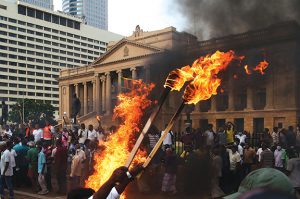Bloomberg
Ahead of the November 2019 election, Sri Lankan presidential challenger Gotabaya Rajapaksa proposed sweeping tax cuts so reckless the incumbent government thought it must be a campaign gimmick.
The finance minister at the time, Mangala Samaraweera, called a briefing to assail the “dangerous†pledge to reduce the value-added tax to 8% from 15% and scrap other levies. To him, it was simple math: Sri Lanka collected relatively less revenue than nearly any other country, and its high debt load had forced it to seek cash
from the International Monetary Fund.
“If these proposals are implemented like this not only will the entire country go bankrupt,†the minister warned, “but the entire country will become another Venezuela or another Greece.â€
It took about 30 months for his prediction to come true, in what’s become a cautionary tale for populist leaders navigating through a world of war, disease and high inflation.
After Rajapaksa won the 2019 election, reviving one of Asia’s most powerful dynasties, he passed the tax cut immediately in his first cabinet meeting. He then quickly restored presidential powers held during the
10-year rule of his strongman brother, Mahinda Rajapaksa, a period that saw the family end a nearly three-decade civil war before getting voted out in 2015 by a citizenry wary of increased oppression and indebtedness
to China.
Instead of learning to govern with more humility, Rajapaksa rushed to restore the family’s brand of populist authoritarianism laced with appeals to nationalism among Sinhalese Buddhists, who make up 75% of the population.
But that strategy quickly backfired. In recent weeks
Sri Lanka ran out of cash to pay for essential goods like food and fuel, leading to long petrol lines and daily 13-hour power cuts. Irate citizens burned loaves of bread and ransacked the health ministry to find medicine.
Protesters have camped outside the president’s office in downtown Colombo for weeks to demand his resignation.
The Rajapaksa family now is in full damage control mode, racing to ensure basic goods
for the citizenry while seeking emergency funds from the IMF, World Bank, China and other lenders. It has stopped paying back foreign debt, defaulting for the first time since achieving
independence from the British in 1948. The country’s stock
exchange, which had soared after the tax cuts, is the world’s worst performer this year — below even Russia.
What’s more, the Rajapaksas have also been forced to retreat on the two major policies it
implemented after the 2019 election.
 The Gulf Time Newspaper One of the finest business newspapers in the UAE brought to you by our professional writers and editors.
The Gulf Time Newspaper One of the finest business newspapers in the UAE brought to you by our professional writers and editors.
